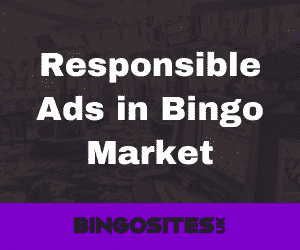On June 24th 2021, the Advertising Standards Authority (ASA) declared bingo ads and promotion material will henceforth be subject to similar regulatory code as gambling ads. Bingo will be considered a betting product and will need to comply with the gambling advertising regulations.
According to WhichBingo 2021 state of the UK online bingo market research:
- 52% of online players are female
- 83% of online players seek entertainment over making money
- 80% of online players are within the range of 25-54 years
- Gala and Tombola are the UK’s biggest bingo sites
- 68% of online players spend between £11 and £50 pounds each month.
The game is regulated by the advertising code for gambling products which states that ads should not condone, portray or encourage gambling behavior that could lead to emotional, financial or social ruin. In its recent ruling, ASA cited examples of breach in the code of broadcasting by Gala Bingo affiliate.
The ad which appeared on www.365dailynews.co.uk/casino touted gambling as a cure for depression, and a quick fix for financial problems. You can read all about the ASA ruling here. If you’re preparing marketing content for a bingo product it’s worth keeping the following in mind:
- Restricted Commercial Intent
Bingo brands are prohibited from suggesting betting as a quick fix for financial problems. Ads are not to be used for commercial intent suggesting gambling as an alternative to employment, or means to financial security as doing so misleads the public.
Alternatively, the ad should inform the public on the need to wager within limits, betting what one can afford to risk, and doing so responsibly.
- Never an escape
Ads that insinuate betting as a scapegoat for personal and professional problems such as anxiety or depression are not allowed. ASA banned an ad by Rehab Bingo after concluding that the use of “rehab” in the advert suggested online bingo as a form of rehab to cure personal issues.
If you’re experiencing personal issues such as stress, anxiety or depression, gambling is highly likely to make it worse even though you’ll experience a surge in excitement. We recommend you seek alternative effective solutions and treatments.
- Mindful Targeting
The advertisement code requires that the ads do not target persons under 18 years in any way by restricting advertising in media channels where they appear. According to the advertising giant, age-restricted ads should not rely fully on age data as underage users can misreport their ages to gain access to the sites. Marketing firms should therefore employ stringent measures using internet-based factors to block out persons aged under 18.
- Ditch Exaggeration of Personal Traits
In line with upholding responsible gambling advertising, marketing communication must not link gambling to sexual prowess, seduction or enhanced attractiveness. The marketing material can feature attractive people without selling it as a solution. ASA considers the following as breaches to this code:
- Showcasing a character’s transformation (person becoming more popular or polished) as a result of gambling.
- Portrayal of a character whose admiration by others is due to gambling.
Gambling in no way should insinuate enhancement in self-esteem, superiority, recognition or admiration.
- Not a Pathway to resiliency or recklessness
Advertisements are prohibited from linking gambling to resilience or recklessness. Brands are advised to exercise caution concerning showcasing a character’s physical or mental strength as a result of their gambling habits. Marketing material should avoid upholding reckless gambling behavior where the character stakes all his remaining chips hoping to make a kill.
- Avoid Impulsiveness
As a way to encourage healthy gambling behavior, marketing advertisement should not pressure the audience into gambling especially when the opportunities are offered within a limited time frame. Offers such as in-play betting or live odds where time limits are unavoidable due to the nature of the events should be presented in a way that doesn’t imply a sense of urgency.
This also applies to short-term promotions where time limits such as, “bet now or time running out” are regarded as a breach of these regulations as they could potentially pressure consumers into participating in bets they would otherwise not.
- Trivialization
Marketers should ensure their promotion copy in no way trivializes gambling and give the impression that the action should be taken lightly. Instances that are prohibited include:
- Encouraging frequent or repetitive participation
- Encouraging individuals to gamble more than they would otherwise do
- Encouraging people to gamble what they can afford to lose
- Encouraging people to exercise caution when opening accounts or taking advantage of promotions
Marketers are allowed to demonstrate the ease of using a service or app but not in a way that might bring challenges under the highlighted points above.
- Inclusion of Begamblebeware
www.begambleaware.org provides information on gambling and solutions to compulsive gambling. The website is a complete resource for individuals seeking support and guidance. There’s also a link to access treatment and specialized support.
Where feasible, the website address should be included on all print and advertisement copy except for when the brand or operator’s sole activity is gambling. Additional requirements include; the website must remain on the screen 10% of the advert’s time frame for television advertising, clearly legible on print copy and at least 100x across digital ad copy.
- Social Responsibility Messaging
Even though the content of social responsibility gaming is the responsibility of the gambling operator, there is need to have some level of commonality. There’s limited evidence on what forms of messaging is the most effective though some brands have crafted their own unique briefing. Examples of social responsibility messaging used include:
- Don’t let the game play you
- Bet with your head- not above it
- Have fun but keep it safe
- Play responsibly
The above is an example of what is deemed appropriate messaging. The aim is to relay the communication in a way that is clear to the people viewing it.
Citation Sources
https://www.whichbingo.co.uk/reports/2021/WB_Annual_Report_2020-2021.pdf
https://www.asa.org.uk/resource/gambling-advertising-responsibility-and-problem-gambling.html

